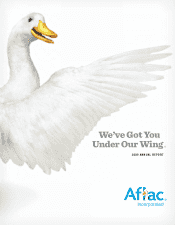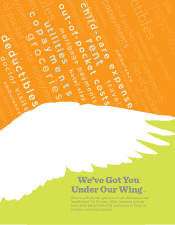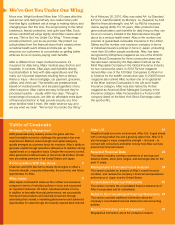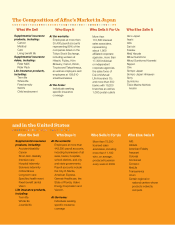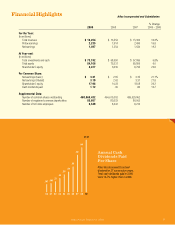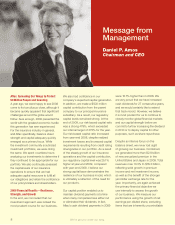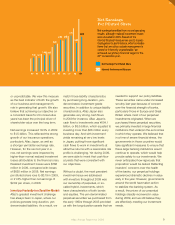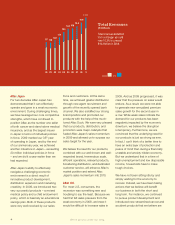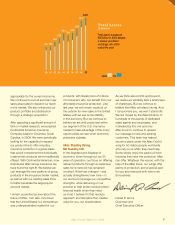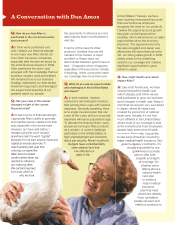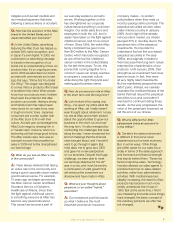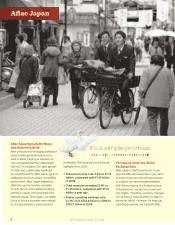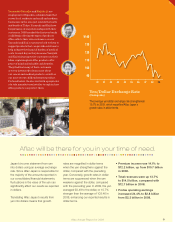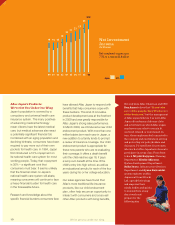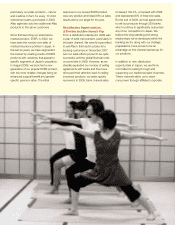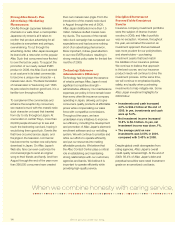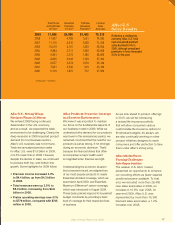Aflac 2009 Annual Report Download - page 11
Download and view the complete annual report
Please find page 11 of the 2009 Aflac annual report below. You can navigate through the pages in the report by either clicking on the pages listed below, or by using the keyword search tool below to find specific information within the annual report.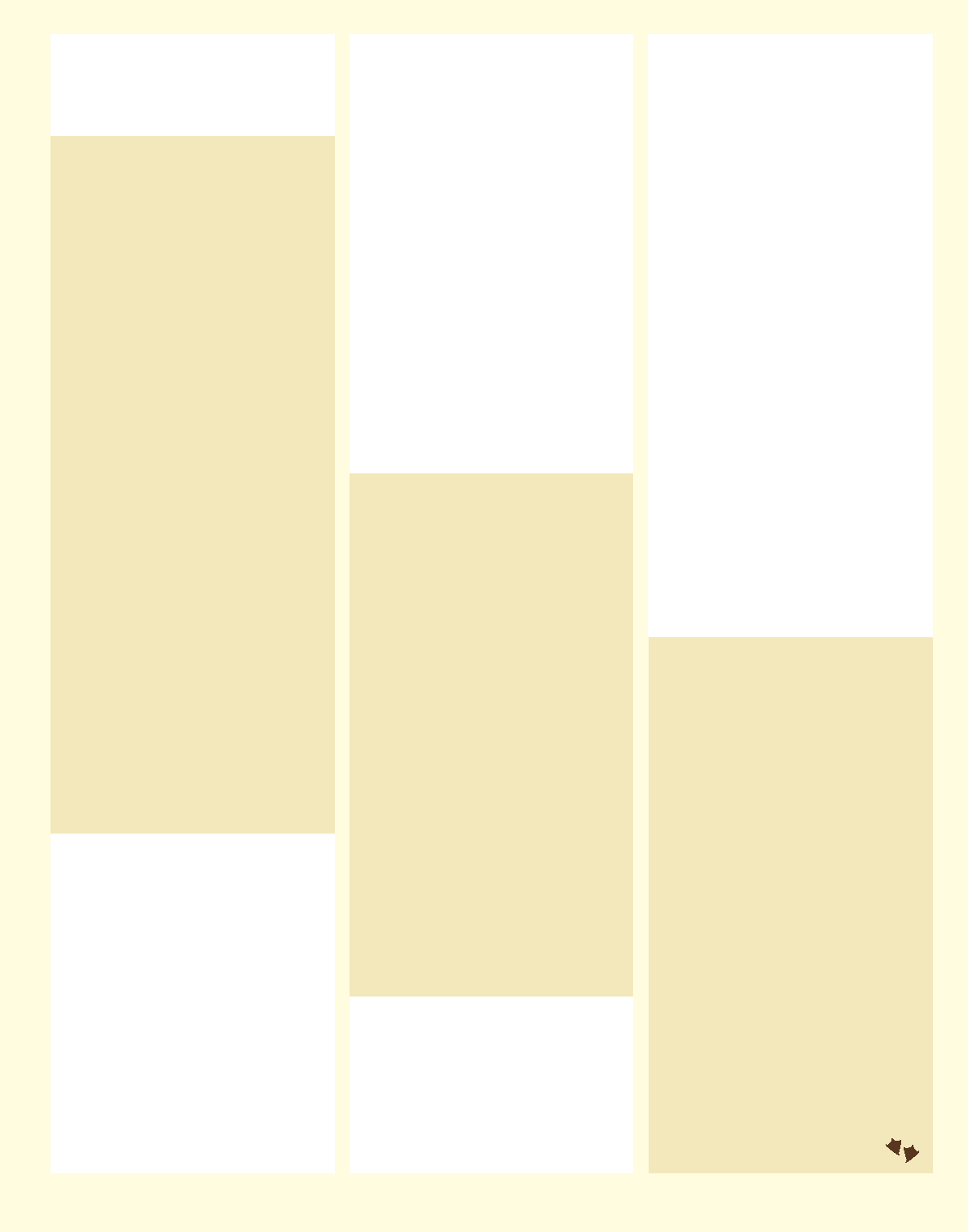
mitigate out-of-pocket medical and
non-medical expenses that arise
following a serious illness or accident.
Q: How has the evolution of the Aflac
brand in the United States and in
Japan benefited your business?
A: In the United States, advertising
featuring the Aac Duck has helped us
achieve 94% name recognition, and
in Japan it’s even higher. In 2005, we
customized our advertising message
to transform the recognition of our
brand into an understanding of how our
products help. It’s an ongoing process,
and in 2009 we advertised our brand
promise with commercials and a new
logo that says, “We’ve Got You Under
Our Wing.” This slogan was designed
to convey that our products offer a layer
of protection they need. When people
know how our products work, I believe
they’ll want the protection that Aac
products can provide. Having a strong
and friendly brand has helped open
many doors for our sales force, even
in tough economic times. Japanese
consumers see a softer, quieter side
of the Aac Duck to t in with their
culture. And last year, we leveraged the
Aac Duck image by dressing him in
a “maneki neko” costume, which is a
beckoning cat that brings good fortune.
The Aac maneki neko duck was an
overnight success that propelled our
sales in 2009 and further strengthened
our brand image.
Q: What do you see as Aflac’s role
in the community?
A: I have always believed that taking
an active role in the community and
being a good corporate citizen makes
good business sense. For example,
15 years ago we began sponsoring
the Aac Cancer Center and Blood
Disorders Service of Children’s
Healthcare of Atlanta. Since then,
the ght against childhood cancer
is something everyone at Aac has
become very passionate about.
This cause has become a part of
our everyday existence and who
we are. Working together on this
has strengthened our corporate
culture beyond anything I could ever
imagine. Our entire sales force and
employees in both the U.S. and in
Japan have taken on the ght against
childhood cancer, and I’m so proud
of them. Since 1995, the entire Aac
family combined has given more
than $50 million to the Aac Cancer
Center, which has been recognized
as one of the top ve childhood
cancer centers in the United States
for the last three years. To me, this
proves that coming together for a
common cause can simply overtake
a company’s corporate culture
while doing the right thing and even
making good business sense.
Q: How do you see your role at Aflac
in the short term and the long term?
A: Let me start off by saying one
thing – I’ve spent my entire adult life
working at Aac, yet I really haven’t
even thought about retirement. I enjoy
my role at Aac and remain excited
about the opportunities to grow our
business in the short run and over
the long term. I’m also energized by
confronting the challenges that arise
along the way. I never envisioned the
kind of challenge that the nancial
crisis brought about, and I wouldn’t
want to go through it again. But
it did allow me to grow as a CEO
and gave me a new perspective
on our business. Despite that huge
challenge, we were able to meet
our earnings objective for the 20th
year in a row, and I look forward to
a continuation of solid growth that
will enhance the investment our
shareowners have made in Aac.
Q: What are your thoughts about
perpetual, or so-called “hybrid,”
securities?
A: Our investment portfolio backs
up what I believe is the most
important promise an insurance
company makes – to protect
policyholders when they need us
most by paying claims promptly. The
perpetual securities we own came
under intense scrutiny in January
2009. And in light of the already
nervous stock market, our shares
plunged 37% in one day due to the
perceived risks of the perpetual
investments. It’s important to
understand that we rst purchased
perpetual securities in the early
1990s, and originally invested in
them because their long-term nature
matched the characteristics of our
products. Until January 2009, their
strength as an investment had never
been an issue. In fact, they were
all very highly rated investments.
But we maintained perspective and
didn’t panic. Instead, we carefully
evaluated the creditworthiness of the
banks that had issued the perpetual
securities to us and concluded it
was best to continue holding those
assets. As the year progressed, the
value of the perpetuals improved, as
did the price of our shares.
Q: What is different for Aflac
salespeople today as opposed to
in the 1950s?
A: Certainly the sales environment
is different in that we’ve never
experienced such a weak economy.
But, in some ways, I think things
are a little easier for our sales force
today in terms of the sales approach
and the brand and nancial strength
that stands behind them. These two
factors help drive sales. Technology
has also allowed our sales agents to
prioritize their time on sales-related
activities, rather than administrative
activities. With medical expenses
steadily increasing, the need for Aac
products has become much more
widely understood than it was in
1955. But at the same time, I nd it
very interesting that while some things
have changed, the basic concept of
the voluntary products we offer has
not changed.
Aflac Annual Report for 2009 7

